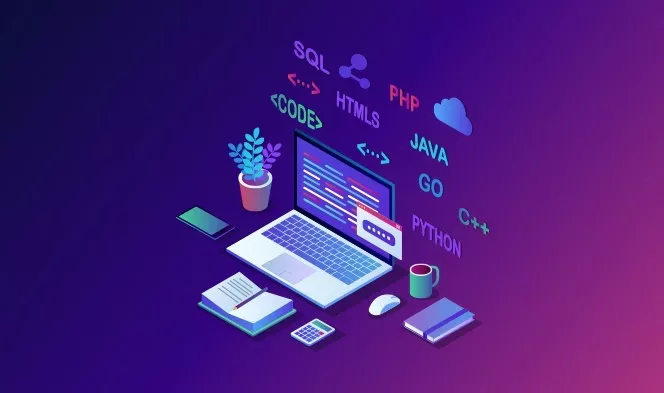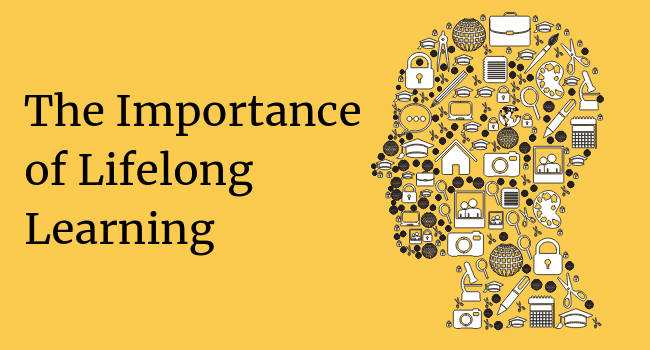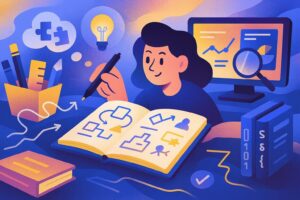In the modern digital age, programming has become one of the most sought-after skills across industries. Whether you aim to develop mobile apps, automate tasks, or transition into a tech career, learning to code is a rewarding endeavor. This guide will walk you through essential resources and practical tips tailored for beginners to help you navigate your way into the world of programming.
Why Learn Programming?
Before diving into resources and tips, it’s essential to understand why learning programming is beneficial. Here are a few compelling reasons:
- High Demand for Programmers: The tech industry constantly seeks skilled developers, offering excellent job prospects and competitive salaries.
- Problem-Solving Skills: Programming teaches you logical thinking and how to approach challenges systematically.
- Career Versatility: Coding skills open doors to various industries like web development, artificial intelligence, data science, and more.
- Creative Freedom: Building websites, games, or apps lets you bring your ideas to life.
Essential Programming Concepts for Beginners
Programming might seem daunting at first, but breaking it down into manageable chunks can make it approachable. Start with the following foundational concepts:
- Variables and Data Types: Learn how to store and manipulate data.
- Control Structures: Understand loops (e.g., for, while) and conditional statements (if-else).
- Functions: Study how to write reusable code blocks.
- Object-Oriented Programming (OOP): Grasp concepts like classes, objects, inheritance, and polymorphism.
- Basic Debugging: Practice identifying and fixing errors in your code.
Selecting the Right Programming Language
The choice of programming language depends on your goals. Here’s a quick breakdown of beginner-friendly languages and their applications:
- Python: Ideal for data science, web development, and automation. It has a simple syntax and a large supportive community.
- JavaScript: Perfect for web development, enabling dynamic website interactivity.
- Java: Great for mobile apps, enterprise software, and Android development.
- C#: Useful for game development and building Windows applications.
- Scratch: A visual programming language designed for kids and beginners to learn programming logic.
When starting, focus on one language, mastering its basics before branching into others.
Tools Every Beginner Should Use
Equipping yourself with the right tools is essential to streamline your learning process. Here are some tools to consider:
- Code Editors and IDEs:
- VS Code: Lightweight and customizable, perfect for beginners.
- PyCharm: Great for Python learners.
- Eclipse: Suitable for Java development.
- Version Control Systems:
- Learn Git to manage code versions and collaborate effectively. Platforms like GitHub and GitLab are great for hosting your repositories.
- Debugging Tools:
- Many IDEs come with built-in debuggers. Practice stepping through code to understand how it runs.
- Online Code Playgrounds:
- Platforms like Replit, CodePen, and JSFiddle let you test and share code snippets online.

Online Resources to Kickstart Your Journey
There’s no shortage of resources for beginners, but here are some of the most valuable ones:
- Interactive Platforms:
- freeCodeCamp: Offers free lessons covering web development, algorithms, and more.
- Codecademy: Provides beginner-friendly interactive coding lessons.
- Video Tutorials:
- YouTube channels like Traversy Media and The Net Ninja are treasure troves for free tutorials.
- Subscription platforms like Pluralsight and Udemy offer structured courses.
- Books for Beginners:
- Automate the Boring Stuff with Python by Al Sweigart: A hands-on guide to practical Python programming.
- JavaScript and JQuery: Interactive Front-End Web Development by Jon Duckett: A visually engaging book for JavaScript learners.
- Coding Challenges:
- Websites like HackerRank, LeetCode, and Codewars help you practice solving coding problems, which enhances your logical thinking.
Tips for Effective Learning
Embarking on your programming journey is exciting but can also feel overwhelming. These tips will help you learn more efficiently and stay motivated:
1. Set Clear Goals
Define why you want to learn programming. Are you aiming for a career in tech, automating tasks, or pursuing a hobby? Clear objectives will guide your learning and keep you focused.
2. Practice Regularly
Consistency is key. Dedicate a set amount of time daily or weekly to practice coding. Start with small projects, such as building a calculator or a simple webpage, to apply what you’ve learned.
3. Learn by Doing
Reading about programming concepts is helpful, but hands-on practice is crucial. Experiment with writing code, even if it’s as simple as printing “Hello, World!” on your screen.
4. Join a Coding Community
Being part of a community can accelerate your learning. Participate in forums like Stack Overflow or Reddit’s r/learnprogramming. Join local coding meetups or online groups where you can ask questions, share progress, and network with peers.
5. Work on Projects
Projects consolidate your knowledge and build your portfolio. Start small and gradually increase complexity. Examples include creating a to-do list app, a personal website, or even a simple game.
6. Don’t Be Afraid to Fail
Programming is about solving problems, and mistakes are part of the process. Debugging and troubleshooting are excellent ways to deepen your understanding.

Structured Learning Paths
To maximize your learning, follow a structured path tailored to beginners:
1. Learn the Basics
- Study variables, data types, loops, and conditionals.
- Focus on understanding how to write clean, readable code.
2. Explore a Language in Depth
- Choose one language and explore its libraries and frameworks. For example, if learning Python, familiarize yourself with libraries like NumPy or Flask.
3. Understand Algorithms and Data Structures
- Topics like sorting algorithms, recursion, and basic data structures (arrays, linked lists, etc.) are foundational for solving coding problems.
4. Build Small Projects
- Create mini-applications to solidify your knowledge. These projects can later serve as portfolio pieces.
5. Learn Version Control
- Master Git basics and host your code on GitHub. It’s an industry-standard skill.
6. Dive Into Specific Areas
- Depending on your interest, you might explore web development, data science, or mobile app development.
Free and Paid Resources to Explore
Free Resources
- CS50’s Introduction to Computer Science: A free course from Harvard that’s beginner-friendly.
- The Odin Project: Comprehensive curriculum covering web development.
- Khan Academy: Offers tutorials on programming basics and algorithms.
Paid Resources
- Udemy Courses: Affordable and detailed courses on specific languages or frameworks.
- Coursera: Offers university-level courses, often with certificates.
- Team Treehouse: Structured coding lessons with interactive practice.
Mobile Apps
- SoloLearn: Bite-sized lessons for learning on the go.
- Mimo: Ideal for daily coding practice.
Overcoming Common Challenges
1. Impostor Syndrome
- Many beginners feel they’re not good enough. Remember, every expert once started as a beginner. Progress takes time.
2. Information Overload
- There’s a wealth of information online. Stick to a curated list of resources to avoid feeling overwhelmed.
3. Debugging Frustrations
- Debugging can be frustrating, but it’s an essential skill. Break problems into smaller parts, use print statements to check code flow, and don’t hesitate to ask for help.
Transitioning from Beginner to Intermediate
As you gain confidence in programming, the next step is to transition from beginner to intermediate. This phase involves deepening your understanding and applying your skills to more complex challenges. Here’s how you can elevate your learning:
1. Specialize in a Domain
Identify an area of interest and dive deeper. Examples include:
- Web Development: Learn frameworks like React, Angular, or Django.
- Data Science: Explore Python libraries like Pandas and Scikit-learn.
- Mobile Development: Study platforms like Flutter or Swift.
2. Work on Real-World Projects
Tackle problems that mimic real-world scenarios. For instance:
- Build a blog or e-commerce website.
- Develop a weather app that pulls data from an API.
- Create a simple chatbot using natural language processing (NLP).
3. Contribute to Open Source
Joining open-source projects is a great way to collaborate with experienced developers, learn best practices, and build a portfolio. Platforms like GitHub provide access to projects of all sizes.
4. Learn Software Development Practices
- Version Control: Use Git for collaborative projects.
- Testing: Write unit tests to ensure code reliability.
- Code Reviews: Participate in reviewing others’ code and welcoming feedback on your own.
Building a Personal Brand as a Programmer
In today’s competitive tech landscape, standing out as a programmer involves more than just technical skills. Building a personal brand can help you showcase your expertise and attract job opportunities.
1. Create a Portfolio
- Host your projects on GitHub and organize them with detailed READMEs.
- Build a personal website to highlight your skills, projects, and certifications. Platforms like GitHub Pages, Netlify, or Vercel make this easy.
2. Share Knowledge
- Write blog posts on platforms like Medium or Dev.to to explain concepts or document your learning journey.
- Share insights on LinkedIn or Twitter to connect with like-minded individuals.
3. Network in the Tech Community
- Attend coding bootcamps, hackathons, or local meetups.
- Join communities like Hashnode or Discord servers related to your field.
4. Stay Updated
- Follow industry leaders and keep up with trends by subscribing to newsletters or listening to tech podcasts.

Importance of Lifelong Learning
The world of programming evolves rapidly, and staying ahead requires continuous learning. Adopt a growth mindset and keep exploring:
- Enroll in Advanced Courses: As you grow, challenge yourself with advanced topics like machine learning, cloud computing, or blockchain.
- Experiment with New Technologies: Stay curious and experiment with the latest tools and frameworks.
- Learn from Failures: Every coding mistake is an opportunity to learn and improve.
Programming is a skill that opens doors to endless possibilities. With determination, consistency, and the right resources, anyone can learn to code. Start small, stay curious, and remember: the best time to begin is now.



